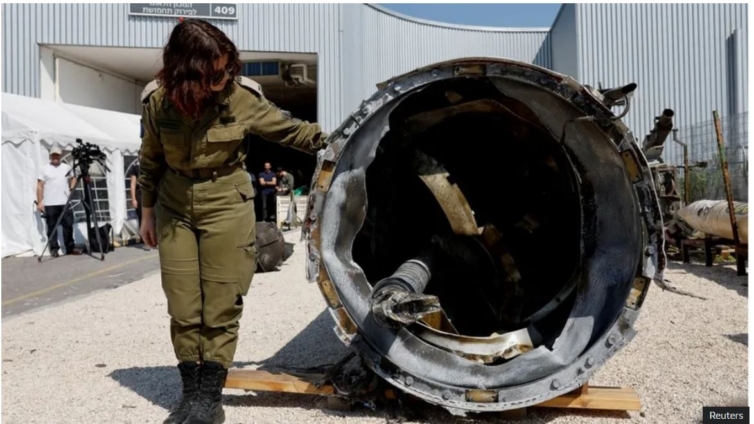Source: BBC
The United States and the European Union say they are looking at imposing further sanctions on Iran, after its attack on Israel at the weekend.
US Treasury Secretary Janet Yellen said she expected to take action “in the coming days”, while EU foreign policy chief Josep Borrell said the bloc was working on it.
Israel has urged its allies to sanction Tehran’s missile programme.
United Nations sanctions over the programme expired in October.
Those sanctions had been linked to a wider deal to limit Iran’s nuclear programme.
However a number of countries including the US, EU and UK maintained sanctions and added new ones.
The Israeli military’s chief of staff, Lt Gen Herzi Halevi, said on Monday that the Iranian attack would not go unanswered.
Iran’s first-ever direct attack on Israel on Saturday saw a wave of more than 300 missiles and drones fired from Iran, Iraq, Syria and Yemen, with most being downed by Israel and its allies.
Tehran said the attack was retaliation for a presumed Israeli air strike on its consulate in Syria on 1 April, in which 13 people were killed.
So far, Israel appears to have countered with only a diplomatic offensive. Its foreign minister urged more than 30 countries to impose sanctions on Iran’s missile programme.
It has also called for the Islamic Revolutionary Guard Corps (IRGC) – a major military, political and economic force in Iran – to be designated a terrorist organisation, something the US has already done but the UK has not.
Speaking on Tuesday, US Treasury Secretary Ms Yellen said: “With respect to sanctions, I fully expect that we will take additional sanctions action against Iran in the coming days.
“We don’t preview our sanctions tools. But in discussions I’ve had, all options to disrupt terrorist financing of Iran continue to be on the table.”
She said Iran’s oil exports were “a possible area we could address”, adding: “Clearly, Iran is continuing to export some oil. There may be more that we could do.”
Ms Yellen said the US was already using financial sanctions to isolate Iran and disrupt its ability to fund proxy groups and support Russia’s war in Ukraine – including by targeting more than 500 individuals and entities.
Existing US sanctions on Iran already ban nearly all American trade with the country.
US National Security Advisor Jake Sullivan said later that the new sanctions would target “Iran including its missile and drone program” as well as the Revolutionary Guards and the Iranian defence ministry.
We anticipate that our allies and partners will soon be following with their own sanctions,” he added. “These new sanctions and other measures will continue a steady drumbeat of pressure to contain and degrade Iran’s military capacity and effectiveness and confront the full range of its problematic behaviours.”
Mr Borrell, the EU’s top diplomat, said some member states had asked for sanctions against Iran to be expanded.
He said he would send a request to the EU’s diplomatic service to “start the necessary work related to the sanctions”.
Israeli Foreign Minister Israel Katz welcomed the “positive trend towards the adoption of sanctions” in a post on X, formerly Twitter.
World leaders have urged restraint in a bid to avoid a major escalation in the Middle East, following the latest attack.
US President Joe Biden – who has repeatedly declared his support for Israel is “ironclad” – has said he believes Israel should declare victory in this episode and “take the win”.
In a phone call on Tuesday evening, UK Prime Minister Rishi Sunak warned Israeli Prime Minister Benjamin Netanyahu against a further escalation in its response.
“He stressed that significant escalation was in no one’s interest and would only deepen insecurity in the Middle East. This was a moment for calm heads to prevail,” a Downing Street spokesperson said.
The G7 group of the world’s seven richest countries was now “co-ordinating a diplomatic response”, they added.
Iran has indicated that it deems the matter “concluded” unless Israel retaliates – with Iran’s President Ebrahim Raisi warning that “the slightest action against Iran’s interests will definitely be met with a severe, extensive and painful response”.
Russia – an ally of Iran – has also urged restraint, the Kremlin said on Tuesday following a call between Russian President Vladimir Putin and President Raisi.
“Vladimir Putin expressed hope that all sides would show reasonable restraint and prevent a new round of confrontation fraught with catastrophic consequences for the entire region,” the Kremlin said.




